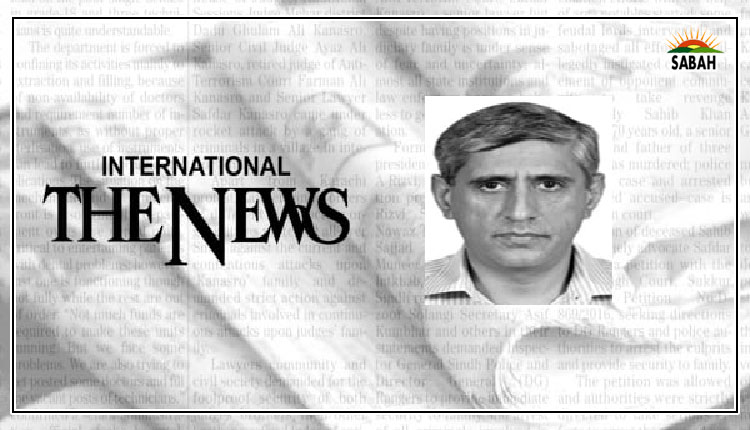Is the future artificial? ….Raashid Wali Janjua
American journalist Fareed Zakaria, in his book ‘Age of Revolutions’, writes that the speed of technological and economic changes is impacting politics in a manner that is causing anxieties and fears among humans, forcing them to seek refuge in old certitudes and proximate identities.
Grand narratives like religious ideologies and fascism, which were eclipsed by postmodernism, are now staging a return with vengeance. The distance that life on Earth travelled in billion years, with the evolution of microorganisms into dinosaurs, might in the future be travelled by artificial intelligence (AI) within just 10 years. With technology, globalization, and medical science travelling at breakneck speed, people are getting more fearful.
The most prominent fear relates to the drowning of their identity and culture under a welter of technological developments unleashed by artificial intelligence and quantum computing. According to writer Yuval Noah Hariri, life forms on this planet that ran on laws of natural selection and organic chemistry would get replaced with the help of science by intelligent design not of nature but of cloud computing. Humans might just be on the cusp of creating the first inorganic life form after billions of years of evolution. The combination of AI and bioscience might yield entities as different from us as we are from Neanderthals.
Regions like Silicon Valley, as per Hariri, would get fabulously rich while those dependent on manual labour might collapse. ‘Autonomous robotically operated weapon systems’ might present problems of security and ethical dilemmas that need global solutions. Since it would be difficult in the future for a single country to monopolize technology, the introduction of ‘high risk, high gain’ technology would entail the acquisition of the same technologies by rivals. Consequently, the world would need global solutions and cosmic vision to grapple with the emerging security dilemmas.
What is unfolding, however, is exactly the opposite. Confronted with the fears of losing their agency as well as identity, people have started seeking refuge in tribalistic behaviour and ethno-religious identities. The ties of blood, race, religion and culture are promoted over a global and humanistic vision. Populists and ideologues thrive on such fears and anxieties by raising the bogeys of identity crisis, economic deprivations, and external threats to rally people behind them.
Immigrants are being painted as a serious threat to American jobs and culture by leaders like Donald Trump, who stoke xenophobic hatred. In Europe, the same role is being played by Victor Orban in Hungary, PM Meloni in Italy, Marine Le Pen in France, and Geert Wilders in the Netherlands. In Asia, Indian PM Modi, and Philippines’ Duterte are examples of populism.
According to Yuval Hariri, developments in geopolitics because of technological development entail globalization of politics, which, in turn, could promote globalization of economics. What the world is seeing instead is a geopolitical competition that is fragmenting politics and setting up barriers in the way of free commerce and the transfer of technology.
Chip wars spawned by a mindset fearful of the rise of rival economic powers are a manifestation of the populism-inspired geopolitical fragmentation of the global order. Isolationist policies followed in international relations inspire a similar retrogression at the domestic level with emphasis on ‘my tribe, my religion, and my creed’.
The cyclical loop of the fears unleashed by technology leading to politics of hate and the economics of exclusion results in a negative energy that can burst open the gates of the global order, giving rise to chaotic revolutions that seriously threaten global peaceand order.
In the domain of communications, technology has spawned the social media revolution that has brought a new set of problems along with it. Jonathan Haidt writes in his book, ‘The Coddling of American Mind’ that the social media revolution has started threatening human mental health, university education and democracy due to its divisive nature.
Democracy is being threatened because social media has taken away the art of human engagement by encouraging compartmentalized thinking. The rot, according to Haidt, began with the invention of the ‘Like’ button by Facebook and the ‘Retweet’ feature by Twitter (now X). Keeping up with an overweening desire not to be ostracized led to a spike in mental illnesses and social polarization. The tyranny of algorithms and the combination of AI and bioscience have put technology ahead of humans, snatching away the art of dialogue and engagement, the two most essential pre-conditions for democracy.
Another set of developments is fueling populism and xenophobia. Climate change and economic insolvency are driving waves of immigrants towards the US and Europe where the fears of demographic transformation are creating anxieties among people.
The fear of loss of cultural and economic space creates a revulsion among people that view new developments, in the words of Walter Lippmann, as ‘acids of modernity’. These acids lead to emptiness that, in the words of Blaise Pascal, is ‘the infinite abyss’.
Now the main challenge of this ‘age of revolutions’ is how to fill that ‘infinite abyss’ to thwart the march of populism and societal strife. Most global scholars recommend the removal of economic inequality and better access to education for people to protect the world from the disruptive impact of the impending revolutions.
Redistribution of economic wealth, equitable access to education, removal of trade barriers, application of fair immigration rules, and embracing economic interdependence instead of geopolitical competition might lure people away from destructive-minded populists who promise revolutions but deliver strife.
The writer is a security and
defence analyst. He can be reached at: rwjanj@hotmail.com
Courtesy The News












